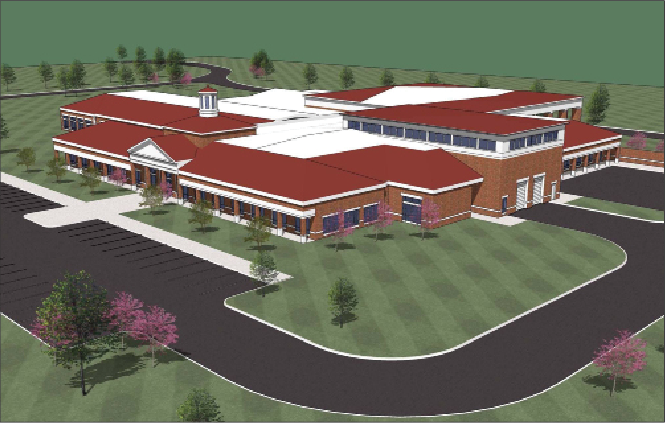Lines of shovels broke into the soil at the groundbreaking ceremony for the new Breathitt Veterinary Center, or BVC, at the Hopkinsville Regional Murray Campus Thursday afternoon.
Gov. Steve Beshear said the BVC is going to have a profound effect on agriculture in western Kentucky.
The BVC’s sister lab in Lexington, Ky., covers diagnostic research in Central and Eastern Kentucky.
“Having a modern, state of the art facility is absolutely essential,” Beshear said.

The new Breathitt Veterinarian Center in Hopkinsville, Ky., will be completed in 2016, and will be approximately 32,000 square feet.
Wade Northington, Program Director at the Breathitt Veterinary Center, said the current facility will remain open until the new one is finished in 2016. The new BVC will be 32,000 square feet.
“Space at the old building was a critical issue,” Northington said. “We will be more than doubling the functional lab space.”
Stephanie Bland, Ph.D. student from Carbondale, Ill., said she was impressed by the size of the new building.
Bland has ongoing research at the BVC, but said the new facility will impact the undergraduates in the pre-veterinary program the most. She said they will have more space to perform diagnostic procedures.
Marissa Bedron, graduate student from Murray, said when her class toured the current BVC, it was crowded.
“As technology advances, machines get bigger,” Bedron said.
All of the equipment in the current building is up to date and will be transferred to the new facility.
“I’m excited to see how (the new BVC) advances classes at Murray State,” Bedron said.
Northington said the new facility will feature state-of-the-art classrooms with 21st century technology.
Tony Brannon, dean of the Hutson School of Agriculture, said 20 students per semester enroll in a course of classes called “the Breathitt Center.” These students occasionally travel to the BVC for labs, but several faculty members give lectures from the BVC online.
“The mission of the diagnostic lab is to serve veterinary technology and pre-medical students,” Brannon said.
Veterinary students seeking doctorate degrees have the opportunity to attend Auburn University with in-state tuition prices, according to Brannon.
There are 36 slots designated yearly for Kentucky students because there are no veterinary schools in the state.
Northington said that the new BVC may partner up with other institutions in the area like Austin Peay in Clarksville, Tenn., in the future.
The new BVC will have heightened safety and biosecurity for its employees and the community.
It will be the only lab in Kentucky to be Biolevel 3 certified. Without this certification, the BVC would have to defer high impact diseases to other labs.
Laura Metcalf, senior from Simpsonville, Ky., said the new facility would allow for expansion of different departments.
“As veterinary medicine develops, the need for labs like the BVC increases,” Metcalf said.
It is undetermined what will happen to the current BVC building once the new facility opens in 2016.
Story by Mari-Alice Jasper, Staff writer



























































































